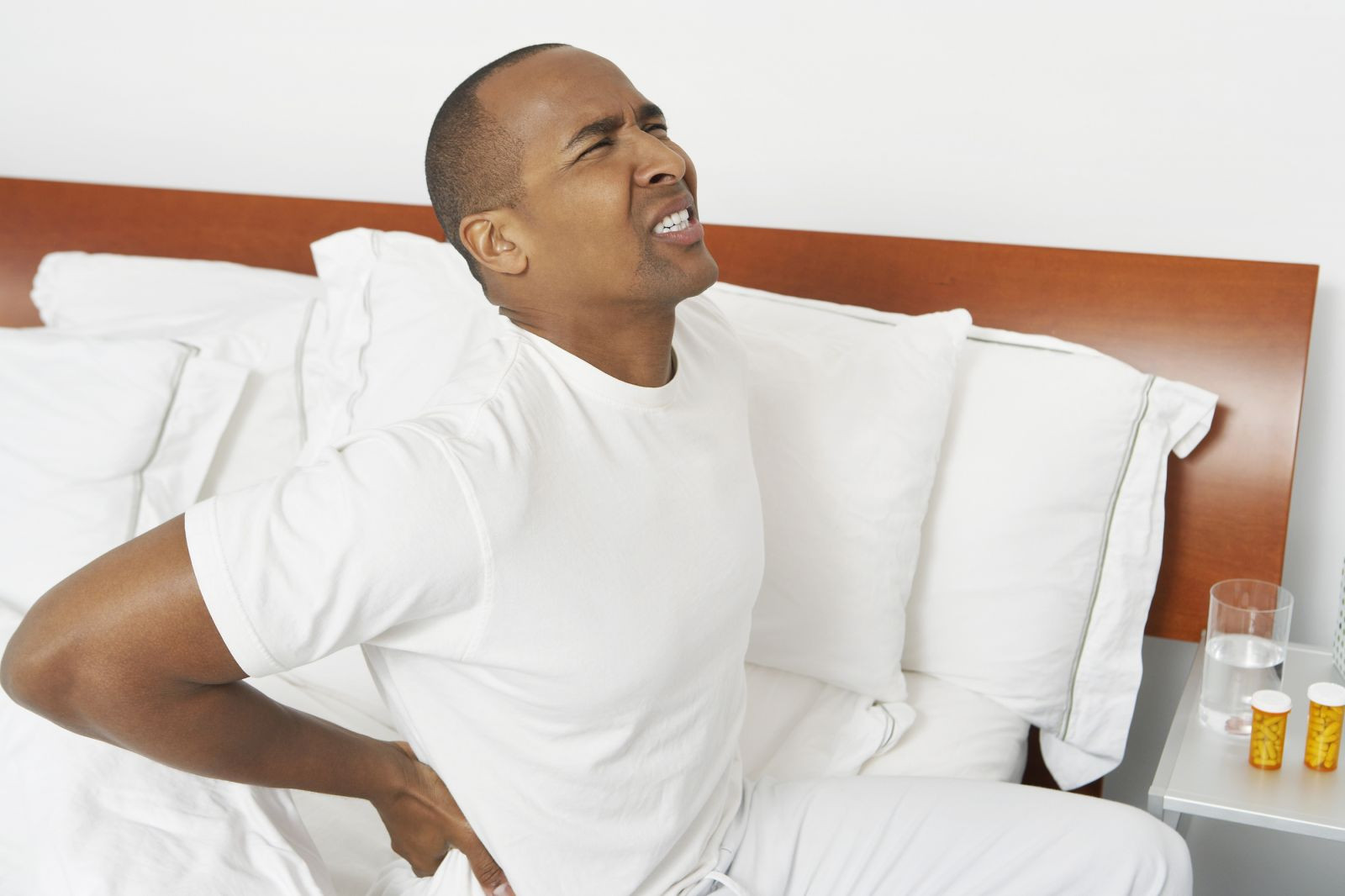
Driving with arthritis pain: Stay comfortable — and safe — behind the wheel

Daily cup of coffee may prevent afib recurrence

Gene-editing therapy lowers harmful blood fats in early study

What is EMDR therapy, and who can it help?

GLP-1 drugs versus bariatric surgery for treating obesity

Two dumbbells, three exercises, and 10 minutes

Easing the emotional burden of IBS

Modify your push-ups to meet your fitness level

What is long QT syndrome?

Stroke survivors may benefit from very low LDL levels
Pain Archive
Articles
The downside of taking pills to treat chronic pain
When the risks of medication outweigh the benefits.
Image: © iStock
Taking over-the-counter or prescription painkillers may seem like a simple solution for chronic pain. It's actually a bit more complicated, yet many older adults aren't aware of potential problems. "They think that if it doesn't require a prescription, it's safe. But there are some long-term health risks," says Dr. Edgar Ross, director of the Pain Management Center at Harvard-affiliated Brigham and Women's Hospital.
Here's what you should know about some commonly used pain relievers.
Emergencies and First Aid - Back Injuries
Unless the person is able to tell you to the contrary, assume that anyone with a back injury also has a neck injury.
Place a board, such as a door or table leaf, next to the person. The board should extend below the buttocks (ideally to the feet) and above the head. Keeping the head aligned with the rest of the body, gently logroll the person toward you. Move the board under the person and ease him or her onto it. If the person is vomiting, lay him or her on one side and continue to support the head.
Bed rest for back pain? A little bit will do you.
Bed rest, once a key part of treating back pain, has a limited role in healing sore backs. In very small doses, bed rest can give you a break when standing or sitting causes severe pain. Too much may make back pain worse. Here is how to do bed rest "right."
To get the most from staying in bed, limit the time you are lying down to a few hours at a stretch, and for no longer than a day or two. You can rest on a bed or sofa, in any comfortable position. To ease the strain on your back, try putting pillows under your head and between your knees when lying on your side, under your knees when lying on your back, or under your hips when lying on your stomach. These positions reduce forces that sitting or standing impose on the back — especially on the discs, ligaments, and muscles.
Are painkillers also killing your hearing?
| Image: iStock |
When you think of risk factors for hearing loss, over-the-counter pain relievers probably aren't among them. But a Harvard study published in the American Journal of Epidemiology suggests that frequent use of ibuprofen (Advil, Motrin) or acetaminophen (Tylenol) may be an important contributor. In the study, women who took the pain relievers at least twice a week were more likely to experience hearing loss, and more frequent usage increased the risk by up to 24%. The findings are similar to a study of men and hearing loss, although aspirin was also found to contribute to risk in that study.
Researchers speculate that the pain relievers may be damaging the cochlea, the snail-shaped hearing mechanism in your inner ear. "Ibuprofen can reduce blood flow to the cochlea, which could result in cellular damage and cell death. Acetaminophen may deplete the antioxidant glutathione, which protects the cochlea from damage," says study author Dr. Sharon Curhan, instructor in medicine at Harvard Medical School.
Does this mean you should think twice before popping a pill for headache or back pain? These medicines do provide good pain relief for many people. "However, frequent use of these medications and use over long periods of time may increase the risk of hearing loss and may cause other adverse health effects. Therefore, it is important to take these medications mindfully and to limit their use as much as possible," says Dr. Curhan. As always, talk to your doctor before making any changes in your medication use.
To learn more about the things that can threaten your hearing, and what you can to do keep this sense sharp and clear, buy Hearing Loss: A guide to prevention and treatment, a Special Health Report from Harvard Medical School.
How does the new vaginal product alleviate pain during intercourse?
Intrarosa, a vaginal insert containing dehydroepiandosterone (DHEA), improves vaginal lubrication to alleviate pain during intercourse.
The healing power of touch
Massage therapy can help relieve pain, speed recovery from injury or surgery, and reduce stress.
Image: Jacob Wackerhausen /Thinkstock
Men may think of massage as an occasional treat or a vacation indulgence, but this type of therapy could be a natural way to stay healthy and pain-free.
One of the most common health issues for older men is chronic pain, defined as pain that lasts more than 12 weeks. This includes back pain, headache, cancer pain, and arthritis pain. Then there are the everyday aches from daily living. All of these act as barriers to a healthy lifestyle.
Body scan mindfulness exercise for pain
Stress reduction expert Jon Kabat-Zinn recommends the body scan mindfulness exercise as the best form of mindfulness meditation for pain conditions.
He advises practicing it every day for 45 minutes, even if it seems boring or doesn't seem to be helping. "You don't have to like it, you just have to do it," he explains in his book. "Whether you find the body scan to be very relaxing and interesting or difficult and uncomfortable or exasperating is irrelevant to whether it will serve you well." The goal of the body scan is not to relieve the pain completely, but to get to know it and learn from it so you can manage it.
How to sleep well despite chronic pain
Chronic pain and insomnia are an unhealthy combination. According to the National Sleep Foundation, chronic pain disturbs the slumber of one in five Americans at least a few nights a week. Whether it's from a bad back, arthritis, or headaches, chronic pain puts you in double jeopardy: the pain robs you of restful sleep and makes you more fatigued, and thus more sensitive to pain.
But you can start to break this vicious cycle.
What makes my joints stiff in the morning?
Morning stiffness like in the back, knees, and feet are common complaints for many older adults. People cannot reverse the affects of joint aging, but they can reduce the severity and frequency of morning stiffness by being more active and adopting regular exercise to increase muscular strength and flexibility.

Driving with arthritis pain: Stay comfortable — and safe — behind the wheel

Daily cup of coffee may prevent afib recurrence

Gene-editing therapy lowers harmful blood fats in early study

What is EMDR therapy, and who can it help?

GLP-1 drugs versus bariatric surgery for treating obesity

Two dumbbells, three exercises, and 10 minutes

Easing the emotional burden of IBS

Modify your push-ups to meet your fitness level

What is long QT syndrome?

Stroke survivors may benefit from very low LDL levels
Free Healthbeat Signup
Get the latest in health news delivered to your inbox!
Sign Up











